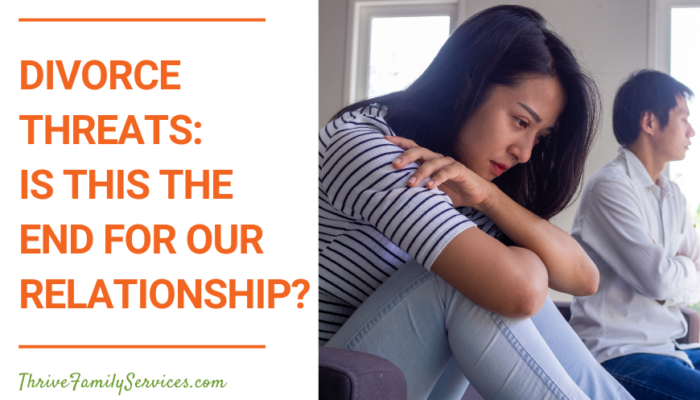Talking about divorce can be scary for any couple. Often times this is what brings couples into couples therapy. But sometimes you might not know if your partner was serious when they threatened divorce – did they just say something out of anger that they didn’t mean, or do they really want to break up? Knowing the difference between the end of the line or an emotional protest can be tricky. Do divorce threats mean your relationship is over?
Heat of the Moment vs. Calculated Divorce Threats
The first thing to consider if your partner suggests divorce is the how and when. Was this in a heated argument or in a thought out way?
We have all said things out of anger that we probably did not mean.
For some partners, this includes threatening to leave. Counter-intuitively, out of fear for the relationship, some partners suggest its demise might be better. This style is acute and often serves more as a protest for the argument, rather than a deep desire to separate.
Is this the time to decide something so life-changing? No, but often times emotions get the best of couples and they dive headfirst into this tender territory.
For some, however, this conversation is very carefully calculated. Partners with this type of approach have been considering a split for some time and tend to have a more organized approach. While this may be a calmer style of communicating, it is no less scary.
This style of divorce threats often indicates that the relationship has been suffering long before this topic was broached. It may mean that the cycle of disconnection has been going on for quite some time between the two of you.
“Do Divorce Threats Mean We’re Over?”
Not necessarily. This is where couples counseling comes in. Your therapist will help you track and assemble the experience that leads to divorce threats.
Your therapist will start by getting curious about this and exploring your current emotional dynamics:
- When has your partner suggested this?
- Has this happened more than once?
- What are they hoping for in the moment?
- How do you typically respond?
- What is the part your partner doesn’t get to see during this exchange?
You may deconstruct interactions between the two of you with your therapist, so you can get to the root of what’s going on. For example:
- Cue: Partner shutting down/Fighting
- Outside Emotional Experience: Defensive/Anger
- Meaning Making: We can’t go on like this./We will fight forever./They don’t love me anymore.
- Inside Emotional Experience: Fear/Anxiety/Panic
- Action: Threaten Divorce
By deconstructing this interaction, partners can become clearer about what’s happening between them in these panicked moments. Frequently, the biggest reactions stem from a place of fear.
“If They Don’t Want to Break Up, Why Would They Say That?”
Good question! On the surface, you’re right. This makes little sense. Why would your love throw out such an inflammatory, hurtful statement?
For some partners, this is their way to protest. They may not want to end the marriage; however, they cannot bear to live under the current conditions.
- “You don’t spend time with me anymore.”
- “We never talk.”
- “We never make love.”
The pain of disconnection and loneliness from a loved one can be overwhelming. Suggesting a divorce is sometimes less about the other partner, and more about the negative cycle existing between them. Divorce can seem like a respite from the pain of disconnection and longing.
By exploring the ins and outs of this interaction, couples can begin to understand their dynamics.
“But What If They Still Want to Leave Even After We’ve Calmed Down?”
If this is the case, your relationship has probably been in distress for a while. Therapy will help you and your partner get a clearer picture of your negative cycle and the disconnection between you.
Understanding this rift and how it was sustained can help you close the gap in your relationship by communicating vulnerably and honestly about your feelings. Emotionally Focused Couples Therapy can help you to reach for each other more effectively and repair that bond.
Therapists have seen couples in entrenched negative cycles rise from the ashes and rekindle their relationship in some extraordinary ways. There is hope in dialogue.
Having the Best Goodbye Possible
While every Emotionally Focused Couples Therapist strives to help repair and strengthen relationships, their real job is to help clients have more honest and vulnerable conversations. For some, this means learning how to say goodbye.
A therapist can help you navigate this tough conversation in a way that feels as loving as possible. After sharing your lives together, you deserve some resolution and peace.




